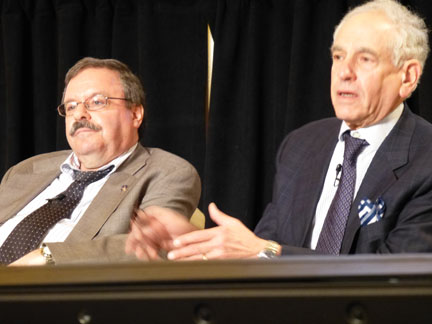NEW YORK — Two American judges who’ve had vast experience with e-discovery matters shared some tips and wisdom for counsel during the morning plenary session at this year’s Legal Tech conference.
 United States Magistrate Judge Andrew J. Peck of the Southern District of New York and Senior Judge Michael M. Baylson of the United States District Court for the Eastern District of Pennsylvania have both been involved with cases involving prodigious documents and millions of dollars. Baylson recently released his decision in Boeynaems v. LA Fitness International LLC, which took on the thorny issue of cost shifting in discoveries. Peck is well known for his thoughts on the emerging predictive coding technology for e-discovery, which caused great buzz after the release of his ruling in Da Silva Moore v. Publicis Groupe.
United States Magistrate Judge Andrew J. Peck of the Southern District of New York and Senior Judge Michael M. Baylson of the United States District Court for the Eastern District of Pennsylvania have both been involved with cases involving prodigious documents and millions of dollars. Baylson recently released his decision in Boeynaems v. LA Fitness International LLC, which took on the thorny issue of cost shifting in discoveries. Peck is well known for his thoughts on the emerging predictive coding technology for e-discovery, which caused great buzz after the release of his ruling in Da Silva Moore v. Publicis Groupe.
While large chunks of the discussion centred on U.S. rules and practices, they did share opinions of value to anyone involved in litigation and looking to manage costs and data. Here are a few of their tips.
 United States Magistrate Judge Andrew J. Peck of the Southern District of New York and Senior Judge Michael M. Baylson of the United States District Court for the Eastern District of Pennsylvania have both been involved with cases involving prodigious documents and millions of dollars. Baylson recently released his decision in Boeynaems v. LA Fitness International LLC, which took on the thorny issue of cost shifting in discoveries. Peck is well known for his thoughts on the emerging predictive coding technology for e-discovery, which caused great buzz after the release of his ruling in Da Silva Moore v. Publicis Groupe.
United States Magistrate Judge Andrew J. Peck of the Southern District of New York and Senior Judge Michael M. Baylson of the United States District Court for the Eastern District of Pennsylvania have both been involved with cases involving prodigious documents and millions of dollars. Baylson recently released his decision in Boeynaems v. LA Fitness International LLC, which took on the thorny issue of cost shifting in discoveries. Peck is well known for his thoughts on the emerging predictive coding technology for e-discovery, which caused great buzz after the release of his ruling in Da Silva Moore v. Publicis Groupe.While large chunks of the discussion centred on U.S. rules and practices, they did share opinions of value to anyone involved in litigation and looking to manage costs and data. Here are a few of their tips.
- When fighting a request from plaintiffs to provide more discovery, especially in the pre-certification stages of a class action, defendants should provide judges with very specific, fact-based affidavits as to what the costs of providing the requested documents would be. Don’t throw out numbers that aren’t supported by facts or simply argue that the requests are overbroad or burdensome.
- When there are disputes over discovery costs, judges may not really appreciate or understand what the case is worth. Defendants need to make clear the reality of their exposure. Sometimes there are obvious dollar amounts but where there are societal values (such as in labor discrimination cases), counsel need to present appropriate information to the court.
- “Bring your geek to court day” is sometimes necessary because it’s the e-discovery experts who both understand the technology and get to the heart of how and what it will cost to “right-size” e-discovery. Those experts will be of enormous assistance to the judge.
- Follow Sedona guidelines on proportionality. Peck says some of the most costly disputes arise from Mickey Mouse problems like lawyers not returning each other’s calls. Co-operation, be it called that or the “strategic release of documents” if your clients aren’t keen on “co-operating,” can keep costs down dramatically. And every client wants that.
- Discovery doesn’t have to be perfect. It just needs to be fair. That requires quite a lot of education for both lawyers and judges in issues surrounding e-discovery.
- The best way for companies to save money on e-discovery costs is to have a records management program in place — “get rid of all the ‘let’s go to lunch e-mails.’” If your information house is in order at all times, it will end up being a lot cheaper when and if you ever end up in e-discovery.
- Judges tend to focus only on the case right in front of them. It’s up to lawyers to educate judges on the number of cases their clients are facing each year, which will help them understand the overall impact of the costs of discoveries and other litigation-related matters.







